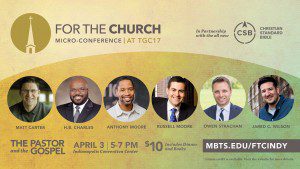 There is much talk about being “gospel-centered” today. I’m thrilled that there is.
There is much talk about being “gospel-centered” today. I’m thrilled that there is.
But what does it mean, precisely, for a pastors to minister in a “gospel-centered” way? Here are three quick thoughts.
First, the pastor’s theology is gospel-shaped. In other words, the atoning death and life-giving resurrection of Jesus Christ is the very fountainhead of all the pastor’s thinking. For the glory of God, the pastor labors to make the message of Christ’s finished work known to needy, hell-bound sinners. He calls for repentance and faith based on this “good news.” He recognizes that the gospel is what the Old Testament points to (and teaches in seed form) and the New Testament fully unveils (Rom. 5:12-21). This salvific truth is the core of Christian doctrine; it is not merely the mechanism that solves the problem of redemption, it is the heart of biblical teaching.
Second, the pastor’s character is gospel-shaped. The pastor is a man who lives a gospel-shaped life. He regularly confesses his sin and repents of it, first to God, and secondly to man. The pastor is not simply an impressive leader who gets a church to drive it on some vague spiritual mission. The pastor is a holy man, a mystic. He is more like John the Baptist in the wilderness than he is a Fortune 100 CEO. A gospel-shaped pastor is not a man who has figured out some new way to be Christian. He is a man you look at and think, “His Savior has changed him, and he is humble, kind, convictional, honorable, self-controlled, and loving” (see 1 Timothy 3:1-7). Only the gospel can accomplish such a personal revolution.
Third, the pastor’s ministry is gospel-shaped. The pastor, full stop, does not put his hope in ministry practices, passing fads, or worldly devices. He trusts to the Word. He preaches the whole counsel of God, with the work of Christ at the burning center, and leaves it to God to sort out the metrics. Faced with a cascading wave of problems on the part of his members, with opposition without and within, he resolves to minister Christ in every situation. This is the center of his work: the grace that is in Jesus (2 Timothy 2:1). In counseling, discipleship, doctrinal training, leadership situations, the pastor unfolds the beauty and power and sufficiency of the Word and the gospel.
This is not a problem; this does not leave him powerless and ineffectual in the big bad secular world. If we have the gospel, we have the very power of God unto salvation (Rom. 1:16). There is no stronger force in the cosmos. There is no greater conqueror of sin. The pastor who preaches Christ and applies Christic grace in a thousand ministry predicaments is not himself the warrior-king from heaven, but he proclaims the one who is.
This vision of gospel-centered ministry (and theology and character) is strikingly different than other models of ministry, which center the horsepower of pastoral labor in attractional bells and whistles, appealing programs, political postures, cultural forms, and a thousand other non-gospel-centered means of drawing people. Two books that offer a counter-cultural, gospel-driven approach to the pastorate: The Pastor’s Justification by Jared Wilson and The Pastor as Public Theologian by Kevin Vanhoozer and yours very truly.
To learn more about gospel-centrality in the pulpit, take the Midwestern Seminary course “The Pastor and the Gospel” at The Gospel Coalition’s annual meeting (April 3-5, 2017) in Indianapolis. Jared Wilson and I will be lecturing (four lectures) on this theme, and as part of the course, students will attend a special For the Church micro-conference featuring Matt Carter, H. B. Charles, Russell Moore, Anthony Moore, Jared Wilson, and me. (This FTC event is held in Indy during dinner of the first day of TGC, so no extra travel necessary).
Register for both the course and the TGC conference here.
Students will also attend sessions of the TGC event itself, and write two papers. You do not need to be a MBTS student to take this course, though MBTS students (both residential and online) are most welcome to take it. This course satisfies the “Leadership Practicum” course that is a required part of MBTS programs, so this is a great way to 1) go to TGC, which will be a great benefit and blessing to you, 2) learn from numerous gospel-loving leaders, 3) read a number of helpful books on the subject (see below–there’s an intentional reading mix of biblical theology, systematic theology, Christian spirituality, and more), and 4) think through the very heart of pastoral ministry: the gospel.
As Jared and I will be providing much of the instruction, it’s our hope that this course will anchor students squarely in the message of Christ as the baseline of ministry. If you get this concept locked in place, you are well on your way to understanding what ministry for the church is all about.
************
Books Required for Masters and College students:
1. David Allen, The Extent of the Atonement: A Historical and Critical Review. B&H Academic, 2016. (read 150 pages minimum)
2. David Gibson and Jonathan Gibson, eds., From Heaven He Came and Sought Her: Definite Atonement in Historical, Biblical, Theological, and Pastoral Perspective. Crossway, 2013. (read 150 pages minimum)
3. Kevin Vanhoozer and Owen Strachan, The Pastor as Public Theologian: Reclaiming a Lost Vision. Baker, 2015.
4. Jared Wilson, The Pastor’s Justification: Applying the Work of Christ in Your Life and Ministry. Crossway, 2013.
5. Owen Strachan and Douglas Sweeney, Jonathan Edwards on Heaven and Hell. Moody, 2010.
Books Required for Masters students only:
1. Stephen Wellum and Brent Parker, Progressive Covenantalism: Charting a Course between Dispensational and Covenantal Theologies. B&H, 2016.
2. Jared Wilson, The Prodigal Church: A Gentle Manifesto against the Status Quo. Crossway, 2013.











